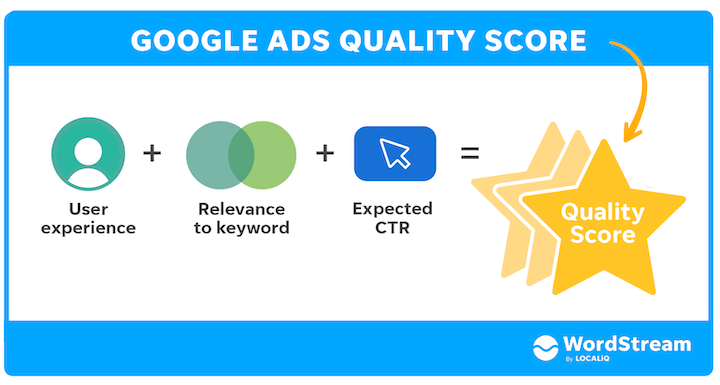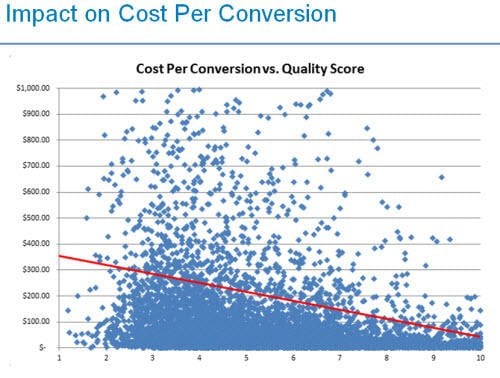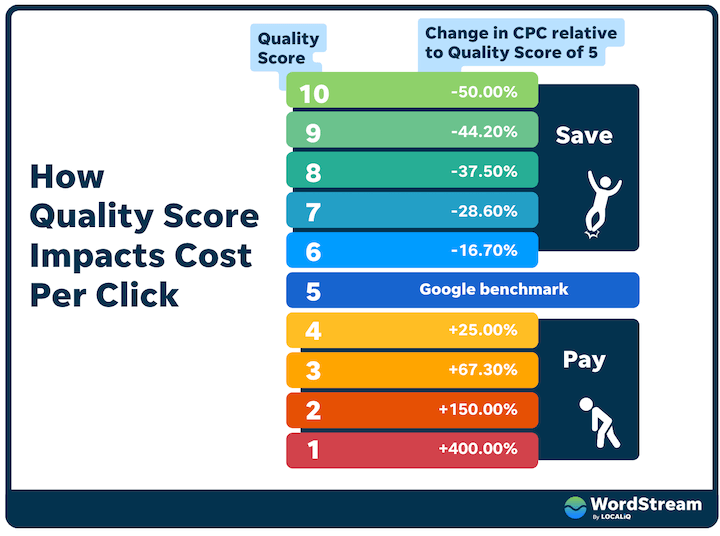What Is Quality Score & How Does it Affect Google Ads?
If you’re trying to master PPC, especially Google Ads, you need a solid understanding of Quality Score. That’s because your Quality Scores have enormous influence over the cost and effectiveness of your paid search campaigns. Just as your credit score can affect whether or not you qualify for a loan and how high your interest rate is, Google Quality Score affects how your PPC ads perform and how much you pay for each click.

From our epic Google Ads auction infographic.
What is Quality Score? Quality Score is Google’s rating of the quality and relevance of both your keywords and PPC ads. It is used to determine your cost per click (CPC) and multiplied by your maximum bid to determine your ad rank in the ad auction process. Your Quality Score depends on multiple factors, including:
- Your click-through rate (CTR).
- The relevance of each keyword to its ad group.
- Landing page quality and relevance.
- The relevance of your ad text.
- Your historical Google Ads account performance.
These are the core Quality Score components. No one outside of Google knows exactly how much each factor “weighs” in the Quality Score algorithm, but we do know that click-through rate is the most important component. When more people who see your ad click it, that’s a strong indication to Google that your ads are relevant and helpful to users. Accordingly, Google rewards you with:
- Higher ad rankings
- Lower costs
Find out how to lower costs in your account with the Free Google Ads Grader.
Benefits of Improving Google Quality Score
By analyzing thousands of PPC accounts, we know that Quality Score has a direct correlation on your success in Google Ads and Microsoft Ads. By optimizing your Quality Scores, you’ll be setting yourself up for higher return on investment (ROI). That’s because higher Quality Scores correlate with lower cost per conversion! Cost per conversion is different from cost per click. It’s not how much you pay for each click, but how much you pay when someone takes the action you want them to take, whether that’s signing up for a free trial or making a product purchase. Since not every click results in a conversion, cost per conversion is generally higher than cost per click.
Luckily, strong Quality Scores lower both your cost per click and your cost per conversion.

Generally speaking, the higher your Quality Score in Google Ads and Microsoft Ads, the lower your cost per conversion. Remember, a high Quality Score is Google’s way of saying that your PPC ad meets your potential customers’ needs. The better you are at meeting the prospect’s needs, the less Google will charge you for the ad click.

How Do You Increase Your Google Ads Quality Score?
Since Quality Score in Google Ads and Microsoft Ads determines where and how often your ads appear, it’s important to boost your ratings by working consistently on your account. This can be achieved by focusing your efforts on several key areas:
- Keyword research – Discover new, highly relevant keywords to add to your campaigns, including long-tail opportunities that can contribute to the bulk of your overall traffic.
- Keyword organization – Split your keywords into tight, organized groups that can be more effectively tied to individual ad campaigns. Use our guide to Google Ads account structure for more help.
- Refine ad text – Test out PPC ad copy that is more targeted to your individual ad groups. More effective ads get higher CTR, one of the best ways to improve Quality Score.
- Optimize landing pages – Follow landing page best practices to create pages that connect directly with your ad groups and provide a cohesive experience for visitors, from keyword to conversion.
- Add negative keywords – Continuously research, identify, and exclude irrelevant search terms that are wasting your budget.
As you can see, Quality Score is primarily a measure of relevance, and improving keyword Quality Score is a matter of structuring your PPC campaigns into small, well-organized, tightly-knit groups of keywords. Better keyword research and organization will also naturally improve the quality and specificity of your ads and website content, allowing you to target the exact audience most likely to be searching for your offerings.
Low Google Ads Quality Scores are primarily the result of a disconnect between keywords, ad groups, ad text, and landing page content. A high Quality Score comes naturally when a Google Ads account contains organized keywords in appropriate keyword groups, ad text that corresponds with certain ad groups, and landing pages that connect with the ad text’s offer. While there is no easy, foolproof answer to improving your Quality Score formula, paying careful attention to relevance will greatly improve your scores.
More Google Ads Quality Score Resources
Want to learn more about how Quality Score works and how to increase your ratings? Check out the following resources:
- Hacking Google Ads: How to Get a (Near) Perfect Quality Score: Learn the characteristics of Google Ads accounts with super-high Quality Scores (and how you can achieve them yourself).
- Complete Guide to Super-High Click-Through Rates: Quality Score is largely determined by click-through rates, which is why it’s so important to write powerful ads that grab people’s attention. In this free guide, you’ll learn what makes a good CTR and how to raise your own CTR’s to create “unicorn” ads with awesome Quality Scores and low costs per click.
